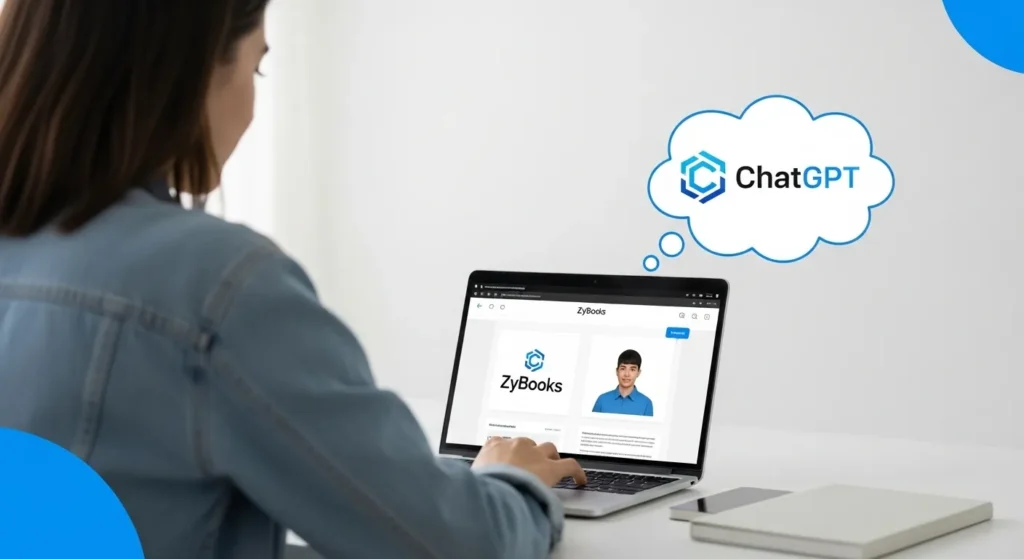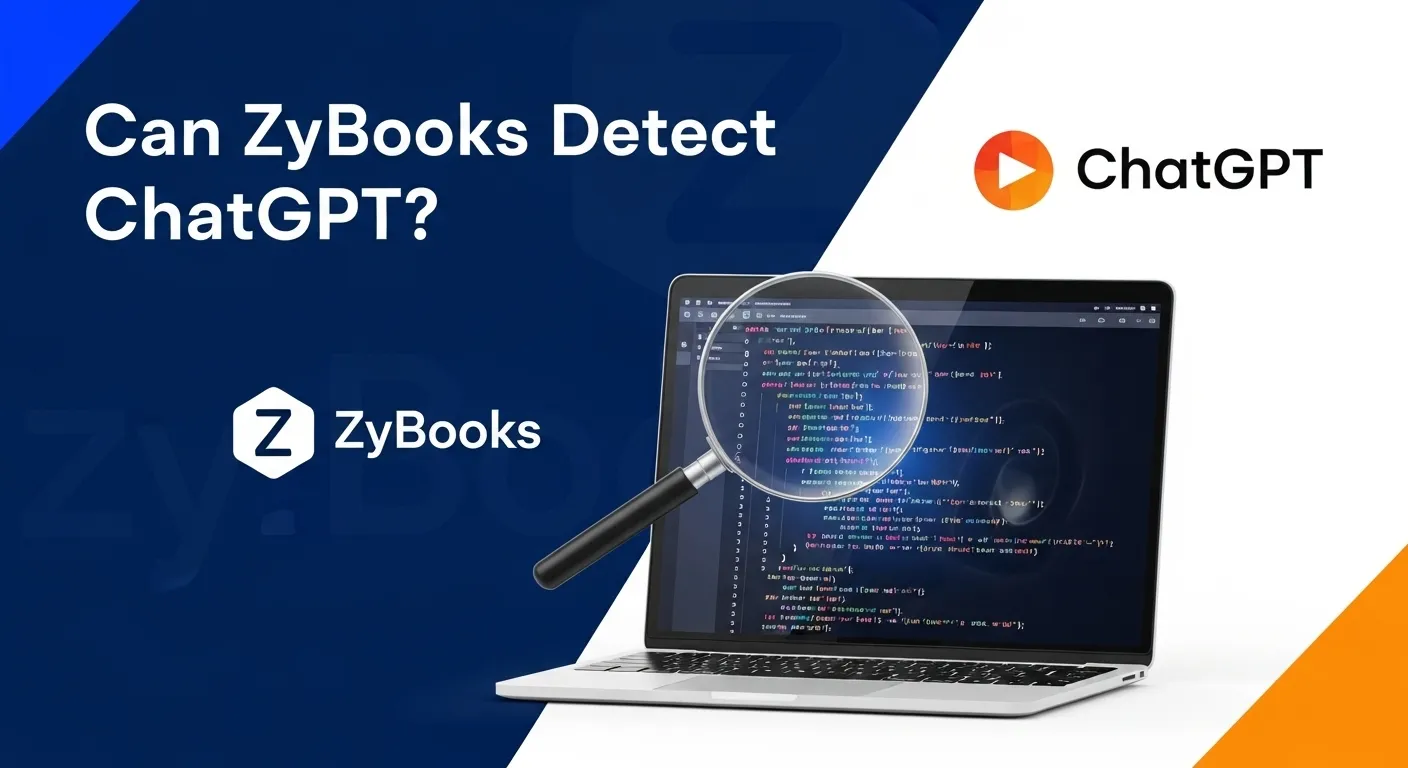Students often wonder if ZyBooks, a popular platform for computer science education, can detect the use of ChatGPT for assignments. With AI tools becoming more common, understanding how platforms like ZyBooks ensure academic integrity is crucial. This article explains what ZyBooks and ChatGPT are, how ZyBooks detects cheating, and the implications for students. We aim to provide clear, up-to-date information to help you make informed choices.

What is ZyBooks?
ZyBooks is an interactive learning platform used in computer science and engineering courses. It offers digital textbooks, animations, practice questions, and coding labs called zyLabs. These labs allow students to write and test code directly in the platform. ZyBooks also provides tools for instructors to monitor progress and ensure students work honestly.
What is ChatGPT?
ChatGPT, developed by OpenAI, is an AI model that generates human-like text, including code, based on user prompts. Students can input a coding problem, and ChatGPT can produce a working solution in seconds. While it’s a powerful learning tool, using it to complete assignments raises concerns about academic integrity.
Can ZyBooks Detect ChatGPT?
ZyBooks doesn’t have a specific “ChatGPT detector,” but its tools can likely identify AI-generated code in many cases. Research from 2023 shows that ZyBooks uses automated systems like the APEX tool, similarity checkers, and coding trails to flag suspicious submissions. While detection isn’t guaranteed, these methods make it risky to use ChatGPT for assignments.
How ZyBooks Detects Cheating
ZyBooks uses several methods to maintain academic integrity in its zyLabs coding environment. These techniques, based on recent research, focus on patterns that suggest external help, including AI-generated code. Here’s how they work:
Style Anomaly Detection
ZyBooks’ APEX tool analyzes coding styles in student submissions. Students typically follow the style taught in their course, like specific variable names or loop structures. ChatGPT often generates code with different styles, such as using std:: instead of using namespace std in C++. These differences, called style anomalies, can be flagged automatically. In a 2023 study, ChatGPT-generated code had anomaly scores as high as 415, compared to a student’s 210, making it stand out.
Similarity Checking
ZyBooks uses a similarity checker, similar to Stanford’s MOSS algorithm, to compare code submissions across students. If multiple students use ChatGPT for the same problem, their code may look nearly identical. In tests, when five or more students used ChatGPT, similarity scores often exceeded 90%, triggering flags. This makes it easier for instructors to spot potential cheating.
Time Analysis
ZyBooks tracks how long students spend on assignments. Human students typically take hours to complete coding labs, but ChatGPT can generate solutions in minutes. In a 2023 experiment, ChatGPT completed 70 labs in under 2 hours, averaging 1-3 minutes per lab, while students needed 45 hours. Fast completion times can raise red flags.
Style Inconsistency
If a student’s code varies significantly in style across assignments, it may suggest external help. ChatGPT can produce inconsistent code, like varying comment styles or indentation. ZyBooks is developing tools to automate the detection of these inconsistencies, making it easier to identify AI use.
Other Detection Methods
ZyBooks is constantly improving its anti-cheating tools. Additional methods include:
- Code Replacement Detection: ZyBooks can spot when students replace large sections of code, which is unusual when coding from scratch.support.
- Proctored vs. At-Home Comparison: Instructors can compare a student’s at-home lab performance with proctored exam results. Big differences may suggest AI use.
- Unique Problem Variations: ZyBooks creates unique assignment requirements, like specific equation formats, to make AI-generated solutions less effective.
- Coding Trails: zyLabs show a student’s coding history, including timestamps and submission attempts. A single submission earning full credit can be suspicious.support.
These methods, combined with the APEX tool’s Overall Concern score, make ZyBooks effective at detecting AI use. In one test, a simulated ChatGPT user scored 0.940 on this metric, topping a 108-student class.
What This Means for Students
Using ChatGPT to complete ZyBooks assignments might seem tempting, but it can harm your learning. Coding skills are built through practice, and relying on AI may leave you unprepared for exams or future courses. If caught, consequences can include failing assignments, courses, or facing disciplinary actions, depending on your school’s policies. Instead, use ChatGPT responsibly—for example, to understand concepts or debug code.
Answers to Common Questions
Based on Google’s “People Also Ask” and “Related Searches,” here are answers to questions students often have:
How does ZyBooks prevent cheating?
ZyBooks uses tools like APEX, similarity checkers, coding trails, and unique problem variations. Instructors also monitor analytics and compare proctored vs. at-home work.support.
Can instructors see if I use ChatGPT?
Instructors may not directly see ChatGPT use, but ZyBooks’ tools can flag patterns like style anomalies or fast completion times, prompting further review.
Is it safe to use ChatGPT for homework?
Using ChatGPT to learn or debug is fine, but submitting its output as your own risks detection and violates academic integrity. Check your school’s policies.
What happens if I’m caught cheating?
Penalties vary by institution but may include failing the assignment, course, or facing disciplinary actions. Always review your school’s academic honesty policy.
Tips for Using AI Responsibly
To avoid issues and maximize learning, follow these tips:
- Use ChatGPT to clarify concepts or debug code, not to complete assignments.
- Practice coding in zyLabs to build skills for exams and future courses.
- Ask instructors for help or use legitimate resources like forums or peers.
- Review your school’s academic integrity policy to stay compliant.
Conclusion
ZyBooks can likely detect ChatGPT use through tools like style anomaly detection, similarity checking, time analysis, and coding trails. Research from 2023 and updates in 2025 show these methods are effective, though not perfect. Using ChatGPT for assignments risks academic penalties and weakens your skills. Focus on honest learning to succeed in computer science and beyond.
For more insights, check out these related articles on Technewscap.com:
